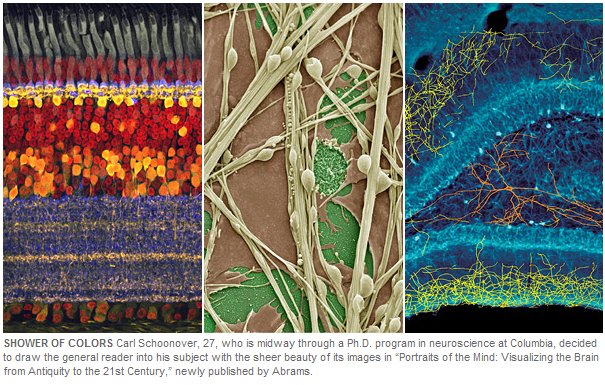Published: November 30, 2010

A glossy new art book, “Portraits of the Mind,” hopes to draw the general reader into neuroscience with the sheer beauty of its images. Check out the stunning slide show of these images on the New York Times Beautiful Mind Slideshow
Source: New York Times
Published: November 30, 2010
New research by University of Minnesota psychologists shows how social support benefits are maximized when provided “invisibly”—that is without the support recipient being aware that they are receiving it.
The study, “Getting in Under the Radar: A Dyadic View of Invisible Support,” is published in the December issue of the journal Psychological Science. [continue reading…]
Published: November 29, 2010
The New Statesman asks the question– Is there such a thing as ‘normal behaviour? As Victoria Brignell takes look at the lives of two eminent autistic scientists
This year the Royal Society has been marking its 350th anniversary. Among the most important figures in the history of British science are Henry Cavendish and Paul Dirac. In the 18th century Cavendish made major breakthroughs in the field of chemistry while in the 20th century Dirac revolutionised our understanding of quantum mechanics and the sub-atomic world. However, they have something else in common too – it’s highly likely that they were both autistic. So what impact did the condition have on the lives of these two remarkable men? And could 21st century scientific advances ironically mean that another genius on the scale of Cavendish or Dirac is less likely to come along in the future?
Source:The New Statesman
Published: November 29, 2010
The Boston Globe reviewed more than 100 accounts by adults who were victims of bullying in their childhoods and who shared their stories in interviews, e-mails to the Globe, and in public online forums
Childhood bullying is an old problem, one that has produced generations of victims. And while many of those bullied as children move past it and thrive in adulthood, a surprising number say they have been unable to leave the humiliating memories behind. Their accounts are supported by a growing body of research suggesting that the bullying experience stays with many victims into young adulthood, middle age, and even retirement, shaping their decisions and hindering them in nearly every aspect of life: education and career choices; social interactions and emotional well-being; even attitudes about having children. Curious?Continue reading

